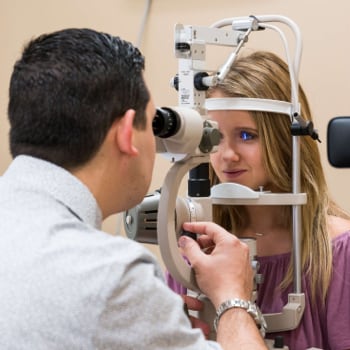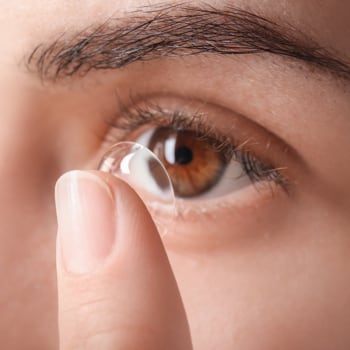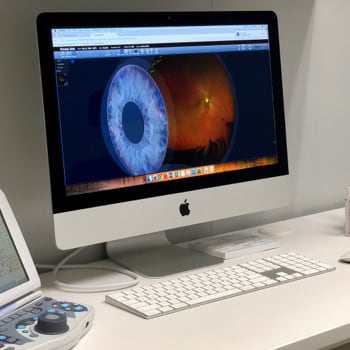Have you ever blinked rapidly, trying to clear that foggy veil from your vision? It’s like looking through a dusty windshield. But did you know the culprit behind this blurred vision could be dry eye? Dry eye is a chronic condition that can cause visual problems like blurry vision.
Dry eyes and blurry vision are more than just minor inconveniences. They can significantly impact your daily life, making driving, working on a computer, or watching television difficult. They can also cause eye health problems if left untreated. So, it’s important to talk to your eye doctor if you experience dry eye symptoms.
What Is Dry Eye?
Dry eye occurs when you don’t have enough tears or the tears you have don’t work properly. It primarily affects the tear film, a thin layer of tears on the eye’s surface to keep them lubricated, nourished, and clear. But dry eye affects the quality of the tear film, leaving our eyes vulnerable to irritation and discomfort.
The tear film is made of 3 distinct and equally important layers:
- The outer oily layer, produced by your meibomian glands, helps prevent tear evaporation.
- The middle watery layer, made by your lacrimal glands, is the largest layer and provides moisture and nourishment.
- The inner mucus layer, produced by goblet cells, helps spread the tears evenly over the eye’s surface.
When you have dry eye, one or more layers of your tear film may be compromised, leading to:
- Increased tear evaporation caused by a problem with the oily layer, leading tears to evaporate too quickly.
- Uneven tear distribution caused by a lack of mucus, making it difficult for tears to spread evenly and leading to dry patches on the eye’s surface.
- Reduced tear production caused by issues with the tear glands not producing enough tears.
Wind, dry air, staring at your computer screen for too long without blinking, and certain medical conditions can also affect tear production and cause dry eyes.
Symptoms of Dry Eyes
Dry eyes can be uncomfortable and even painful, causing symptoms like:
- A gritty or scratchy sensation
- Burning or stinging
- Light sensitivity
- Blurred vision
- Redness in the eyes
- Excessive tearing (the eye’s natural reflex to dryness)
If left untreated, dry eyes can lead to more serious complications, such as eye infections and corneal damage.
Why Does Dry Eye Cause Blurry Vision?
Dry eye can cause blurry vision in a couple of ways.
Besides protecting and nourishing your eyes, your tear film also helps focus light so you can see clearly. When your eyes are dry, this film is disrupted, affecting how light is focused. It’s like looking through a rippled window—things appear blurry.
Dryness can also irritate the surface of your eye (the cornea). A damaged cornea scatters light instead of focusing it, contributing to blurry vision.
Fortunately, blurry vision caused by dry eye is usually temporary and should clear up once your eyes are lubricated again.
What Can Cause Blurry Vision?
Other conditions can also cause blurry vision, including:
- Refractive errors: Nearsightedness, farsightedness, and astigmatism are errors with the eyes that make light focus incorrectly, causing blurry vision at different distances.
- Age-related changes: Presbyopia is an age-related refraction error that occurs after age 40. It’s why arm stretching has become the new normal for reading menus.
- Eye conditions: Glaucoma and cataracts are common eye conditions that can cause blurry vision.
- Medical conditions: Diabetes and high blood pressure can affect eye health and vision.
- Medications: Some medicines have ocular side effects that affect your vision.
- Eye strain: Too much time on screens and not blinking can dry up the tear film.
Managing Dry Eyes & Blurry Vision
Dry eyes causing blurry vision can be frustrating, but there are ways to manage it. Here are some steps you can take:
- Eye drops are your first line of defense. Look for preservative-free artificial tears to lubricate your eyes throughout the day.
- Warm compresses followed by gentle eyelid massage can help loosen clogs in tear glands and improve tear quality.
- Take breaks from screens, avoid smoke and dry air, and increase your water intake. All these things can contribute to dry eyes.
- If over-the-counter solutions aren’t enough, your eye doctor can prescribe stronger medications or recommend other treatments during an eye exam.
The Next Steps
Blurry vision is a common symptom of dry eye. If you constantly battle blurry vision, your eye doctor can run the necessary tests to get your vision back on track. Remember, every pair of eyes is unique, and what works for your friend might not work for you.
Book an appointment with us at Great Hills Eye Care at any of our 3 locations: Georgetown, Pflugerville, or North Austin. We can help treat your dry eye symptoms and work towards improving your eye health.














